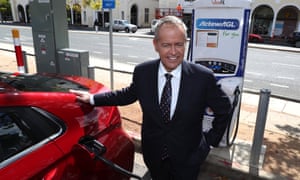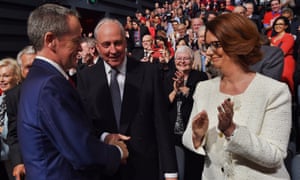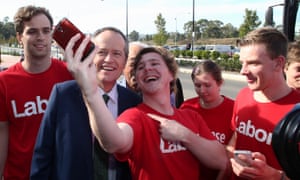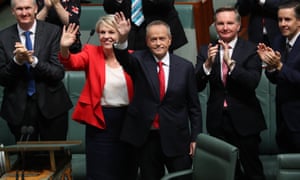The opposition leader has unified Labor after its past leadership
traumas and will position himself as the right choice for the times
Before
the last federal election, in the winter of 2016, I asked some of Bill
Shorten’s colleagues to describe the federal Labor leader in a word. Lucky was the word they invoked most often.
Repeating this same exercise three years later, as Shorten enters a new election cycle, a different word emerges. To be clear, there are official words about the Labor leader: words like “tenacious”, and “determined”, and “tested” – but the unofficial word, once you clear the talking points, is ready.
Ready is unofficial, firmly in the category of bootleg, because “ready” implies hubris. “Ready” validates Scott Morrison’s oft-repeated attack line that Shorten is already so cocky, he’s measuring up new curtains for the Lodge.
But “ready” in this context isn’t about cocky. The truth is Labor is
nervous as it enters this battle. One person told me this week their
current status was “anxious as hell”. But Shorten’s colleagues believe
things are more tranquil inside the leader’s head. They think their
frontman is like a boxer, itching to get the gloves on; intent on
hitting the pain barrier and pushing through it. “He’s been waiting for
this moment for five years,” one colleague says. “Bill’s ready to
campaign, he loves to campaign; and he’s ready to govern”.Repeating this same exercise three years later, as Shorten enters a new election cycle, a different word emerges. To be clear, there are official words about the Labor leader: words like “tenacious”, and “determined”, and “tested” – but the unofficial word, once you clear the talking points, is ready.
Ready is unofficial, firmly in the category of bootleg, because “ready” implies hubris. “Ready” validates Scott Morrison’s oft-repeated attack line that Shorten is already so cocky, he’s measuring up new curtains for the Lodge.
The collective ambition was an election result that would put them back within striking distance of government. Victory wasn’t expected, because victory at that time seemed impossible. Malcolm Turnbull, Labor thought, would be prime minister for a decade, but the voters and Turnbull’s colleagues had other ideas.
Labor’s performance in 2016 exceeded expectations, and that experience gave Shorten two things: more confidence, both in himself and in the party’s campaign machine, and a lifeline to remain federal leader for another term.
This time, the opposition enters the contest as the pre-match favourite. The Coalition has not been ahead of Labor in the Guardian Essential poll since July 2016, and then the government was ahead only by a whisker: 50.5% to 49.5% two party preferred. You have to travel back to May 2016 to find the Coalition in front 51% to 49%. On paper, this is Labor’s election to lose.

The basic dynamics are also different. Rudd first positioned himself as a more contemporary version of Howard, and then commodified himself with the Kevin07 brand. The strategy in 2019 is entirely different. Shorten and Labor are actively repudiating the agenda and character of the contemporary Liberal party. Rejecting the status-quo is at the core of efforts to rally public support for a change of government. Labor also seeks to minimise Morrison’s prime ministerial authority whenever possible by referring to him as “the current bloke”.
Shorten and Labor are not, in this contest, playing “me too” with a future focused twist. There is no slipstream strategy. The offering is high visibility contrast.
If there’s a meaningful comparison with past elections to make, the more pertinent touchstone is 2004, although Labor at that point sold their leader Mark Latham in over-the-top messianic style – a decision the party came to rue.
Shorten is not being sold in the way Labor sold Latham in 2004, or in the way Rudd sold Rudd in 2007. Shorten is in fact selling Labor, not himself. The “team” dominates the talking points, and the “team” flanks Shorten when the opposition leader bobs up with the requisite two attack lines on the evening news. He regularly fronts press conferences with multiple shadows, many of whom are well known from Labor’s last period in government.
2019, for Labor, is a brand campaign, not a presidential one.
The external marketing reflects Shorten’s leadership style. For a highly ambitious politician, in a tearing hurry to get to the front of the line, Shorten has made a study of recessing himself in the Labor leadership.
He hasn’t sought to centralise everything, as leaders with sharp elbows very often do. Colleagues say he runs a genuine shadow cabinet process. Shadow ministers are given a lot of latitude in policy development, and Shorten allows them to prosecute the arguments both in public and in private. There has also been a noticeable rapprochement in recent months between Shorten and Anthony Albanese. Shorten used to keep Albanese, his rival in the ballot that installed him as party leader, at a distance. Albanese is now back in the fold, and being deployed both in determining tactics behind the scenes and in frontline debate. Given Albanese is a popular figure, and poses no threat to Shorten, it’s in Labor’s interests to keep him visible.

The public being broadly underwhelmed might be a function, as Chris Bowen argued this week, of the opposition leadership being a really tough gig. Asked why Australian voters continued to have reservations about the Labor leader despite the long courtship, Bowen said: “You’ve got to hold the government to account, point out their errors, argue that they are wrong and keep a sunny disposition and be a positive personality in the debate – and that is really hard”. Bowen said when opposition leaders became prime minister “they become preferred prime minister that day. That is what history would teach us. I would hope and expect it is the same for Bill”.
Some MPs think there has been some sign over the past six months that undecided voters are making their peace with the Labor leader. If you ask the people reporting this to explain what they mean, they will recount conversations with voters in which people now assume Shorten will win, so they make observations like “well, he can’t be any worse than the other bloke, right?”
He was active in both elevating Julia Gillard in 2010, and then ending her leadership in 2013. In 2013, Shorten appeared in public on the night of the caucus ballot to play the assassin from central casting, announcing that he had switched his support from Gillard back to Rudd. While colleagues insist that Shorten jumped in, perhaps opportunistically, at the end, after Gillard’s prime ministership was terminated by power brokers who preserved their reputations by declining to play the undertaker live on television, one notes “the public moments cast him as the villain”.
The Labor party civil war between 2010 and 2013 ruptured more than the caucus and the ministry – it also divided union leaders and cleaved party members and long term supporters into tribes. Given the indulgences of that period cost Labor office, resentments among the true believers still run deep.
Shorten cannot erase his past, or airbrush himself into an entirely new commodity, but what he can do with some authority is present his mastery of his own institution, which is a combination of learning and intuition, as a credible pathway to achieving policy stability, and through that, societal transformation.
If he lacks the charisma to create a connection point with voters, if he can’t persuade them to make an emotional connection with him, to affirm him in the way voters affirmed Rudd in 2007, he can construct connection points by empathising with the lived experience of others, not as an abstraction, but by producing policy that speaks to contemporary anxieties and aspirations.

The team have provided the intellectual grunt and the policy direction, but it is Shorten who has to front the agenda, and it will be Shorten who is felled if Labor has misread the zeitgeist. Colleagues will not give him a third term as opposition leader if Morrison is the prime minister on May 18. It will be the end of the line.
Bowen, who made a public pledge this week that Shorten would still be the party leader at the election of 2022 if he wins in 2019, amplified the mea culpa about the indulgences of the past implicit in Shorten’s messaging. The shadow treasurer, who like Shorten was a player in the intrigues of the past, said everyone regretted throwing away government after securing it in 2007. “We got that wrong, so we changed the rules … more importantly, we changed the culture”.
“We are not going to do that again. We’ve got to be a good government for Australia. Australia can’t afford another bad government like this one with all of the instability that goes with it. We will have our good and bad days, like every government does. Some days are better than others. But if you stick with the policy agenda which we have laid out, and you stick with each other, on the good days and bad, we will be a good government and the Australian people will recognise that”.
The fact Shorten likes power, likes wielding it, likes landing transactions, cannot be denied. It’s etched in his record. But the Labor leader can also, potentially, transform a vulnerability into a strength if he can convince voters over the coming weeks that a politician who is master of his political movement is what is needed at this point in history to stop the country spinning its wheels.
Shorten can point to unity and purpose. He can point to an institution that is evolving and enduring at a time when political parties in major democracies around the world are weak, riven, and quaking before the big responsibilities of this moment in history. He can present a strong executive-in-waiting at a time when democratic governments are crumbling under the pressure. He can style himself as nuts-and-bolts manufacturer capable of holding the constituent parts together in a time of political disruption and turbulence, and getting a result.
The question Shorten will unfurl before the voters, because of who he is, and because of the sum of the past decade or more of Labor history, is do the times suit me? Does the country need a prime minister who has the emotional intelligence to read a room, but is ruthless enough to swing an axe if that’s what is required?

No comments:
Post a Comment